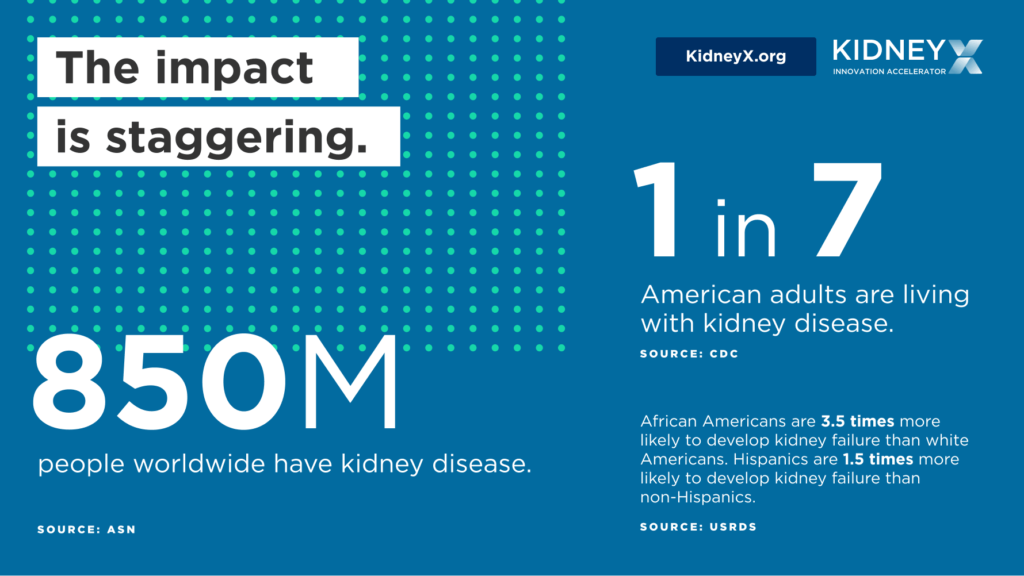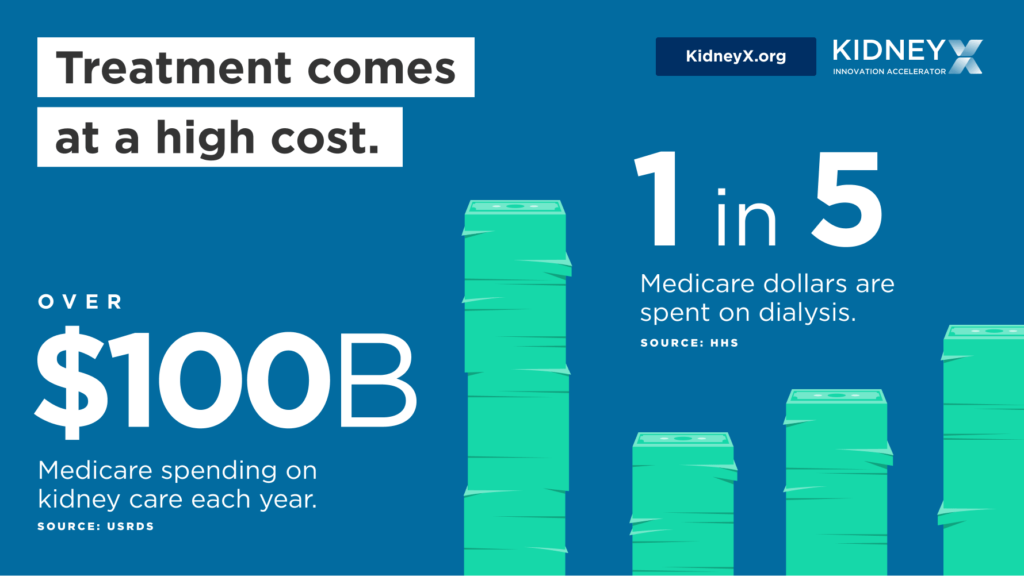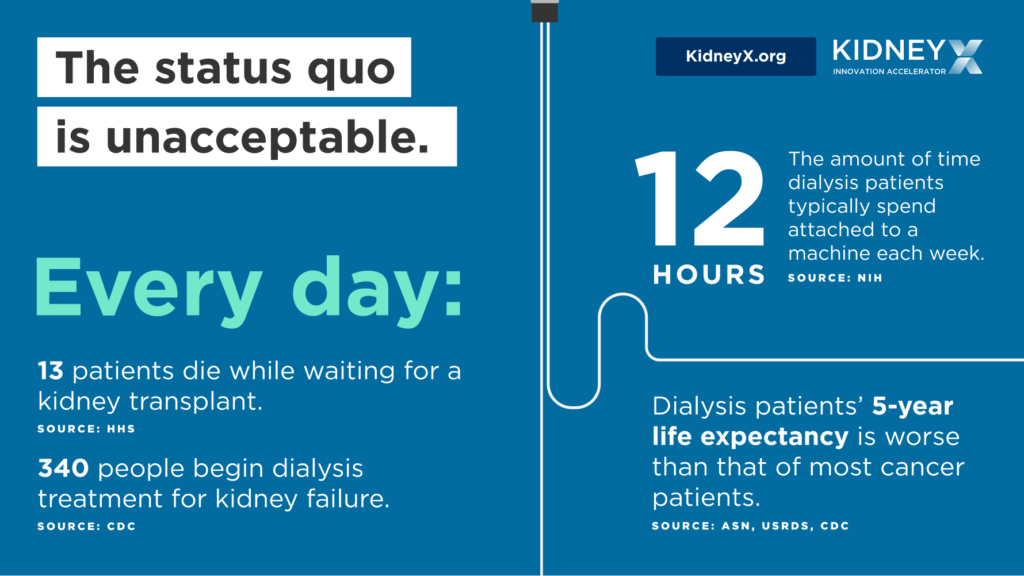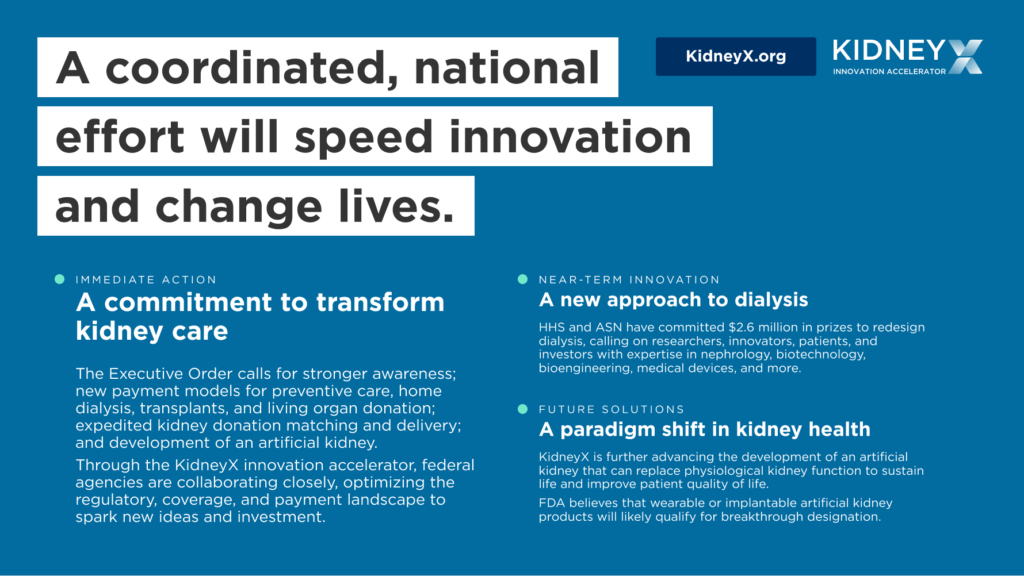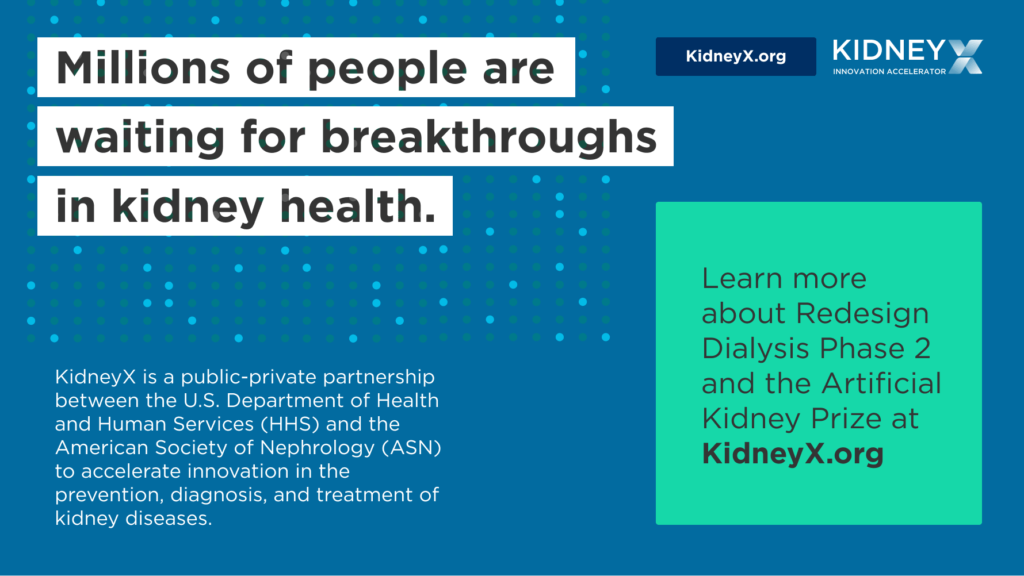When you say “chronic disease,” most people immediately think of diabetes, heart disease, and — increasingly — even cancer. Even though one in seven Americans are living with kidney disease and it’s the ninth leading cause of death in the United States, kidney diseases are rarely discussed. This lack of conversation has also coincided with a lack of research, and therefore, innovation; many people are working on solutions for diabetes, heart disease, and cancer — but until recently, there have been fewer incentives to innovate for kidney care.
There are many misconceptions about kidney disease. For starters, it’s not a monolithic condition. When we say “kidney disease” or “kidney diseases,” it’s inclusive of multiple conditions and causes — including chronic kidney disease caused by diabetes and high blood pressure, acute and chronic glomerulonephritis, and genetic polycystic kidney disease. Kidney disease does not always result in kidney failure (sometimes called end-stage kidney disease or end-stage renal disease); today, the only treatments for kidney failure are dialysis or a kidney transplant.
In the United States, 15% of adults — 37 million people — are living with kidney disease. Worldwide, 850 million people have kidney disease — more than double the number of people living with diabetes. Low-income and minority communities are disproportionately affected by kidney disease; African Americans, Native Americans, and Hispanics are at increased risk for kidney failure.
The numbers are alarming, and they’re going up: By 2030, the Centers for Disease Control expect 16.7% of Americans ages 30 and over to have kidney disease.
Each year, Medicare spends more than $100 billion on kidney care. As U.S. Department of Health and Human Services Secretary Alex Azar noted in a speech at the National Kidney Foundation’s annual summit earlier this year, one in five Medicare dollars are spent on dialysis.
Of course, the dollar amount is only part of the cost. Dialysis is disruptive to life and not patient-centered. If in-home dialysis isn’t available, patients must visit a facility for several hours, several times each week, where they’re attached to a machine that removes excess waste, salt, and water from the body. Dialysis technology has not fundamentally changed in more than 60 years, and dialysis patients’ five-year life expectancy is worse than that of most cancer patients.
Each day, 340 people begin dialysis treatment for kidney failure, and they spend twice as many days in the hospital as transplant patients. Some patients are candidates for a kidney transplant; nearly 100,000 Americans are on the waiting list for a kidney transplant, and 13 people die each day waiting for a new kidney.
Innovation isn’t just possible, it’s imperative. The Kidney Health Initiative’s technology roadmap outlines considerations for overcoming technical and market challenges to improve dialysis and transplant outcomes.
Earlier this year, an Executive Order called for stronger awareness; new payment models for preventive care, home dialysis, transplants, and living organ donation; expedited kidney donation matching and delivery; and development of an artificial kidney.
Through the KidneyX innovation accelerator, federal agencies are collaborating with the American Society for Nephrology, optimizing the regulatory, coverage, and payment landscape to spark new ideas and investment.
Near-term innovation: A new approach to dialysis
The U.S. Department of Health and Human Services and the American Society of Nephrology have committed $2.6 million in prizes to redesign dialysis, calling on researchers, innovators, patients, and investors with expertise in nephrology, biotechnology, bioengineering, medical devices, and more.
KidneyX’s inaugural prize competition, Redesign Dialysis Phase 1, invited participants to submit proposals on approaches that could enable the design of new artificial kidney devices, extending life and improving quality of life. This first phase received 165 submissions that ranged from innovations in vascular access and fluid filtration to innovations in hemodialysis and biosensors. The 15 Phase 1 winners each received $75,000.
Redesign Dialysis Phase 2 seeks prototype solutions, or components of solutions, that can replicate normal kidney functions or improve dialysis access. Prototypes should address at least one of the following areas: blood filtration, electrolyte homeostasis, volume regulation, toxin removal and secretion, filtrate drainage and connectivity, and dialysis access. Submissions are due by January 31, 2020. (New participants are welcome to compete in the second phase.) Up to three winners will each be awarded $500,000.
Future solutions: A paradigm shift in kidney health
KidneyX is further advancing the development of an artificial kidney that can replace physiological kidney function to sustain life and improve patient quality of life. The Food and Drug Administration believes that wearable or implantable artificial kidney products will likely qualify for breakthrough designation.
The KidneyX Artificial Kidney Prize is expected to launch in April 2020 and run for up to four years. HHS is seeking input: Responses to the RFI are due by December 13, 2019.
 The nephrology community has been working on kidney care solutions. We’re equally excited to see KidneyX inspire solutions from other spaces.
The nephrology community has been working on kidney care solutions. We’re equally excited to see KidneyX inspire solutions from other spaces.
View the full infographic and share it with a biotech, bioengineering, or medical device expert who should join Redesign Dialysis Phase 2 or respond to the Artificial Kidney Prize RFI.
Luminary Labs is honored to support prize competitions and innovation accelerators, including KidneyX, on behalf of HHS.


